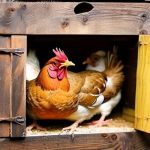Integrating turkeys and chickens in a single flock can be a viable option for poultry keepers. These two species can generally cohabitate without significant issues, and their interactions can provide interesting observations for flock owners. Turkeys are typically characterized by their inquisitive and gregarious behavior, while chickens tend to be more cautious and protective of their territory.
When combined, turkeys and chickens can form a diverse and functional flock, with each species contributing unique attributes to the group dynamic. However, successful integration of turkeys and chickens requires careful consideration of several factors. These include:
1.
Distinct care requirements for each species
2. Appropriate housing accommodations
3. Potential health risks and disease transmission
4.
Social dynamics within the mixed flock
5. Specific nutritional needs for turkeys and chickens
6. Predator protection strategies
Understanding and addressing these aspects is crucial for maintaining a healthy and harmonious mixed flock of turkeys and chickens.
Table of Contents
Key Takeaways
- Keeping turkeys with chickens can be a rewarding experience, but it requires careful consideration and planning.
- Turkeys and chickens have different care and housing requirements, including space, roosting preferences, and temperature tolerance.
- There are potential health risks and disease transmission between turkeys and chickens, so biosecurity measures are crucial.
- Understanding the social dynamics and compatibility between turkeys and chickens is important for a harmonious flock.
- Meeting the feeding and nutritional needs of both turkeys and chickens is essential for their health and well-being.
Differences in Care and Housing Requirements
Differences in Space and Nutrition
Turkeys are larger and more robust than chickens, requiring more space to roam and forage. They also have different dietary needs, requiring higher protein levels in their feed compared to chickens.
Housing Requirements
When it comes to housing, turkeys need larger roosting and nesting areas to accommodate their size. Additionally, turkeys are more susceptible to respiratory issues, so proper ventilation in their housing is crucial. On the other hand, chickens are more adaptable to various housing setups and can thrive in smaller spaces.
Unique Challenges and Considerations
They are also more resilient to respiratory issues but can be more prone to pecking order conflicts within the flock. Understanding these differences is essential for providing suitable care and housing for both turkeys and chickens in a shared environment.
Potential Health Risks and Disease Transmission

When keeping turkeys with chickens, there is a risk of disease transmission between the two species. Turkeys are particularly susceptible to blackhead disease, which is caused by a parasite that is carried by chickens. This disease can be fatal to turkeys if not properly managed.
Additionally, turkeys are more prone to respiratory issues, and exposure to pathogens carried by chickens can exacerbate these problems. It is crucial to practice good biosecurity measures when keeping turkeys and chickens together, such as regularly cleaning and disinfecting shared spaces, preventing direct contact between the two species, and monitoring for any signs of illness. By being proactive in disease prevention, the risk of health issues and disease transmission between turkeys and chickens can be minimized.
When keeping turkeys with chickens, there is a risk of disease transmission between the two species. Turkeys are particularly susceptible to blackhead disease, which is caused by a parasite that is carried by chickens. This disease can be fatal to turkeys if not properly managed.
Additionally, turkeys are more prone to respiratory issues, and exposure to pathogens carried by chickens can exacerbate these problems. It is crucial to practice good biosecurity measures when keeping turkeys and chickens together, such as regularly cleaning and disinfecting shared spaces, preventing direct contact between the two species, and monitoring for any signs of illness. By being proactive in disease prevention, the risk of health issues and disease transmission between turkeys and chickens can be minimized.
Turkeys and chickens have different social dynamics and behaviors within a flock. Turkeys are known for their curious and social nature, often forming strong bonds with their human caretakers as well as other poultry species. They are generally more peaceful within a mixed-species flock and can act as protectors against potential predators due to their size and alertness.
Chickens, on the other hand, have a well-established pecking order within their flock and can be territorial towards new additions or different species. When introducing turkeys to an existing chicken flock, it is important to monitor their interactions closely to ensure that any conflicts are resolved peacefully. Providing enough space, resources, and supervision during the integration process can help establish a harmonious relationship between turkeys and chickens within the flock.
Turkeys are known for their curious and social nature, often forming strong bonds with their human caretakers as well as other poultry species. They are generally more peaceful within a mixed-species flock and can act as protectors against potential predators due to their size and alertness. Chickens, on the other hand, have a well-established pecking order within their flock and can be territorial towards new additions or different species.
When introducing turkeys to an existing chicken flock, it is important to monitor their interactions closely to ensure that any conflicts are resolved peacefully. Providing enough space, resources, and supervision during the integration process can help establish a harmonious relationship between turkeys and chickens within the flock.
Feeding and Nutritional Needs
Turkeys have different dietary needs compared to chickens due to their size and growth requirements. Turkeys require a higher protein content in their feed to support their rapid growth and development. A turkey-specific feed or supplement with at least 28% protein is recommended for young turkeys (poults), while adult turkeys require a feed with around 20-24% protein content.
On the other hand, chickens have lower protein requirements and can thrive on a standard poultry feed with around 16-18% protein content. It is important to provide separate feeding stations for turkeys and chickens to ensure that each species receives the appropriate nutrition without competition or overconsumption. Additionally, offering access to forage areas with insects, plants, and grass can provide supplemental nutrition for both turkeys and chickens.
Turkeys require a higher protein content in their feed to support their rapid growth and development. A turkey-specific feed or supplement with at least 28% protein is recommended for young turkeys (poults), while adult turkeys require a feed with around 20-24% protein content. On the other hand, chickens have lower protein requirements and can thrive on a standard poultry feed with around 16-18% protein content.
It is important to provide separate feeding stations for turkeys and chickens to ensure that each species receives the appropriate nutrition without competition or overconsumption. Additionally, offering access to forage areas with insects, plants, and grass can provide supplemental nutrition for both turkeys and chickens.
Predation and Protection

Predator Protection
Turkeys are larger and more alert than chickens, making them effective guardians against potential predators such as hawks, foxes, or raccoons. Their keen senses and vocal alerts can help warn the flock of impending danger.
Vulnerability at Night
However, turkeys themselves are vulnerable to predation, especially at night when they roost on low branches or on the ground. Providing secure coops or shelters with predator-proof fencing can help protect both turkeys and chickens from nocturnal predators.
Deterrents and Safety Measures
Additionally, using deterrents such as motion-activated lights or sound devices can help deter predators from approaching the coop area. By taking these precautions, you can create a safe and secure environment for both turkeys and chickens to thrive.
Conclusion and Considerations for Keeping Turkey with Chickens
In conclusion, keeping turkeys with chickens can be a rewarding experience that offers unique social dynamics and benefits within a mixed-species flock. However, it is important to understand the differences in care, housing requirements, potential health risks, social dynamics, feeding and nutritional needs, as well as predation and protection considerations when integrating turkeys with chickens. By providing suitable housing, nutrition, disease prevention measures, social integration supervision, and predator protection, a harmonious relationship between turkeys and chickens can be established within the flock.
With proper management and attention to the specific needs of both species, keeping turkeys with chickens can create a diverse and thriving poultry community on the homestead or farm.
If you’re considering keeping turkeys with chickens, you may also be interested in learning how to convert a shed into a chicken coop. Check out this helpful article on poultrywizard.com for tips and advice on creating a suitable living space for your feathered friends. Additionally, if you’re curious about keeping guinea fowl with chickens, you can read more about it on poultrywizard.com.
FAQs
Can you keep turkey with chickens?
Yes, it is possible to keep turkeys with chickens. However, there are some considerations to keep in mind when housing these two species together.
What are the considerations when keeping turkeys with chickens?
When keeping turkeys with chickens, it is important to provide separate feeding and watering stations for each species. Turkeys have different nutritional needs than chickens, so it is important to ensure that they have access to the appropriate feed. Additionally, turkeys are larger and more aggressive than chickens, so it is important to provide enough space for both species to avoid overcrowding and potential aggression.
Do turkeys and chickens get along?
In general, turkeys and chickens can get along if they are properly introduced and provided with enough space and resources. However, it is important to monitor their interactions and be prepared to separate them if any aggression occurs.
Are there any health concerns when keeping turkeys with chickens?
There are some health concerns to consider when keeping turkeys with chickens. Turkeys are susceptible to certain diseases that chickens may carry without showing symptoms. It is important to practice good biosecurity measures and monitor the health of both species to prevent the spread of disease.
What are the benefits of keeping turkeys with chickens?
Keeping turkeys with chickens can provide some benefits, such as companionship for the birds and potential pest control. Turkeys and chickens may also help to keep each other warm during colder months by huddling together.
Meet Walter, the feathered-friend fanatic of Florida! Nestled in the sunshine state, Walter struts through life with his feathered companions, clucking his way to happiness. With a coop that’s fancier than a five-star hotel, he’s the Don Juan of the chicken world. When he’s not teaching his hens to do the cha-cha, you’ll find him in a heated debate with his prized rooster, Sir Clucks-a-Lot. Walter’s poultry passion is no yolk; he’s the sunny-side-up guy you never knew you needed in your flock of friends!







